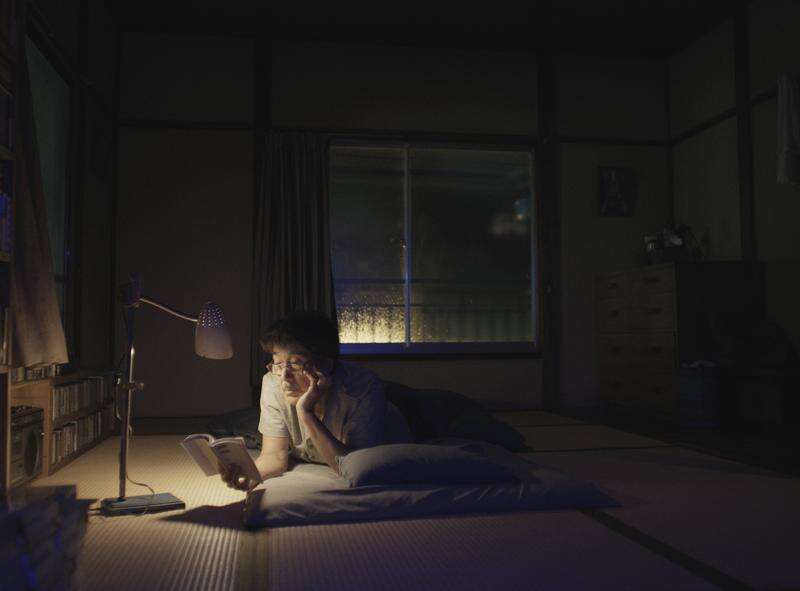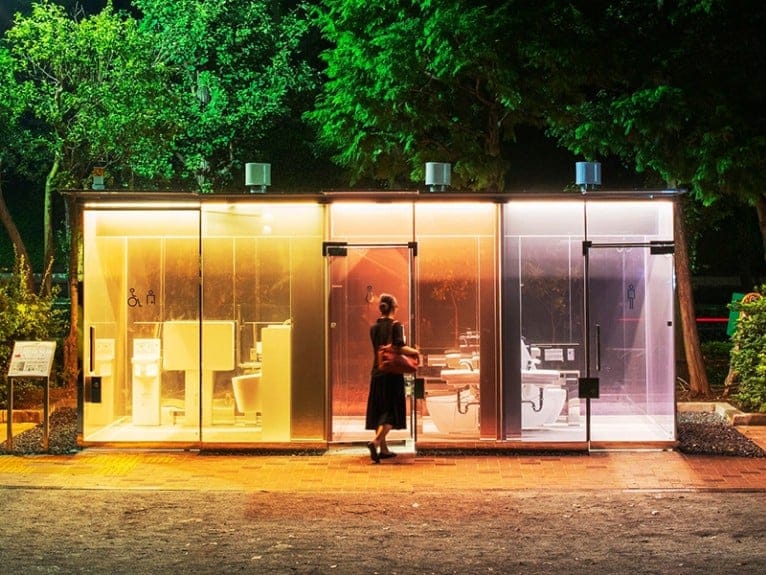IN PRAISE OF SHADOWS (AND TOILETS!)

Dedicated to my sensei of the blue sky mind, PW.
Now all the hullabaloo of the 2024 Oscars has finally been dispensed with and film lovers can once again see the wood for the trees beyond all the ridiculous 'ponce and wonce' of the front runners award season campaigns, it's become abundantly clear to many of us that Wim Wenders' 'Perfect Days' (2023) was by far the most effortlessly impressive movie of the 23/24 season.
Compared to Scorsese's overwrought, hand wringing, white guilt mea culpa 'Killers Of The Flower Moon' or the endless three hour montage sequence that is 'Oppenheimer' and the deliberately claustrophobic art installation 'The Zone Of Interest', 'Perfect Days' provides a reminder of cinema at its most purely natural and human, choosing minimalist poetic storytelling over maximum narrative or conceptual overkill. There is oxygen in this urban movie that surprisingly brings nature closer to the viewer than one might expect from a story that is set in one of the world's most populated cities.
For me, it is the work of an old master paying homage to his old masters - most notably Akira Kurosawa and Yasujirō Ozu. Wenders has said that he essentially lives in service to his shisho, Ozu - that most minimalist and unaffected filmmaker - who observed the beauty and pathos of human suffering and yet always remembered to maintain good humour also. Anyone who has seen 'Tokyo Story' or 'Floating Weeds' will know how well Ozu makes the minutiae and daily ebb and flow of his characters' lives the compelling focus of his dramas. I liken his films to examining the intricacies of a rock pool that seems well harboured from the raging sea but contain on closer inspection all sorts of subtle and cyclical rhythms and hierarchial interplay. Wenders himself seems to share a similar benign observance of his world as his central character, Hirayama (Kōji Yakusho) does to his. A re-occuring feature of Wenders' work is his ability to trade off his alien perspective in foreign cultures, re-inventing himself à la Tom Ripley (see 'The American Friend') and yet observing his subjects with loving compassion. It might be said that the German director is like a composite of Bruno Ganz's angel in 'Wings Of Desire' and his latest central character in 'Perfect Days'.
Shooting in an Ozu-like 2x3 frame throughout the movie, there is a visual comfort in containing each scene in this painterly like format. The nighttime transitions into early dawn directed by Donata Wenders are like those of soft water colours in mellow monochrome that also draw to mind the dreamy impressionism of Ghibli's 'Princess Kaguya'. These memory-filled flashbacks, like gentle rain on a roof, are beautifully and mysteriously ambiguous and leave it to us to imagine what they truly represent in relation to our central protagonist who is mute for good stretches of the movie - not unlike Travis (Harry Dean Stanton) from Wender's iconic 'Paris, Texas' (1984).
Us westerners are often accused of being afraid of shadows (literal and symbolic) and eliminating them with as much distraction and light as we can find without a thought for making friends with these uncertain, dimmed atmospheres which the Japanese celebrate so much in their traditional culture, if not always possible in neon-saturated Tokyo.
The classic 1933 essay, 'In Praise Of Shadows', offers sixteen sections in which the dichotomy between east and west and their respective relationship with shadows and light are poetically examined in "a classic description of the collision between the shadows of traditional Japanese interiors and the dazzling light of the modern age". So too, then, does Wenders' film contrast the eternal spirit of Japan's aesthetic Zen Buddhist philosophy with the buzzing neon metropolis of modern Tokyo, seeming to find a happy balance between old and new.

In charting the daily work life of toilet cleaner Hirayama, Wenders creates a sort of meditation-like approach to revealing the character's simple yet poetic life. All of the sublime seventeen toilets included in 'Perfect Days' were designed by such famous architects as Tadao Ando and Kengo Kuma for The Tokyo Toilet project in the city's Shibuya district and commissioned by The Nippon Foundation as a demonstration of "Japan's world-renowned famous hospitality culture." Certainly, after watching 'Perfect Days', non-Japanese viewers can only look on with envy at such holistically designed and visually ingenious spaces for what are generally treated as mundanely utilitarian and often unsanitary facilities. I imagine one would far prefer to be a toilet cleaner in Japan than in Britain where I recently visited a public bog that was straight out of one of Irvine Welsh's novels. Aside from the inescapable stench and wet floor, there was a broken sensor for the water in the dispenser faucet leaving me with nothing but cheap soap on my hands and a half assed dryer to make it extra foamy with nothing to dry it off with. Where was my Hirayama?!
Perhaps then, the toilet is a perfect metaphor for Wenders' latest masterpiece which is finding beauty in the mundane and honouring its continuity in our lives to anchor us from the raging tempests of samsara that can so easily destroy and take away what we have in any given moment. With its ever present danger of earthquakes, Japan is a culture especially suited to dealing with the existential uncertainty of life and the fragility of existence that many have taken for granted in the west where tectonic volatility is generally less of a daily threat. In some ways, the toilets in 'Perfect Days' seem to act as both reminders of our primal bodies and our inescapable relationship with nature in the sense of the natural order of how things work and function in our human life. With Hirayama dutifully cleaning these porcelain shrines he is enacting a spiritual practice of sorts where his being continually reminded of the mortal bind of our basic functions from birth and not once or complacently losing sight of it observing it as the great equaliser between young and old, rich or poor.
There is also the use of the classic master/apprentice trope throughout the film where Hirayama is often assisted in his toilet cleaning supervision by Takashi (Tokyo Emote), a comedic counterpoint to Hirayama's more reserved disposition. Youth versus wisdom is a common and archetypal way to demonstrate the teaching of a life lesson, especially in story form - think only of Obi Wan Kenobi and Luke Skywalker in 'Star Wars: Episode IV: 'A New Hope' or Mr Miyagi and Daniel in 'The Karate Kid' (1984). Here, Wenders plays these two characters off each other as both performances by the two men complement the other perfectly.
In the end though, it is undoubtedly Wender's gentle hero that provides the heart of the movie. Yakusho's Hirayama possesses the same timeless quality of many great elders (Chishū Ryū, Kanji Watanabe) throughout the history of Japanese cinema, his love of American popular music on cassettes being his only attachment to remind him of his youth as it's clear toward the end of the film he's made peace with his place in the world. His spiritual equilibrium is exemplified in the final shot as his even-tempered face shifts between happiness and sadness, like sun and clouds, shadow and light.
My life may appear melancholy,
But traveling through this world
I have entrusted myself to Heaven.
In my sack, three quarts of rice;
By the hearth, a bundle of firewood.
If someone asks what is the mark of
enlightenment or illusion
I cannot say -
wealth and honor are nothing but dust.
As the evening rain falls
I sit in my hermitage
And stretch out both feet in answer.
Ryokan